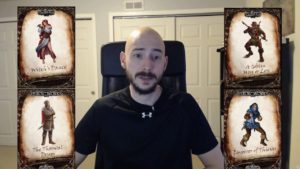 There are few new tricks in role playing games, the question is how can you take that old trope and make it fresh? CSI: Neverwinter takes the heroes from another place/time trope and does its own wild spin on things. CSI: Neverwinter begins with beat cop, an undercover cop, and a DA who get taken across the dimensional divide between Earth and Toril. They are given new bodies in order work at the direction of a shady “other” power and try to stop crime and be heroes along the way.
There are few new tricks in role playing games, the question is how can you take that old trope and make it fresh? CSI: Neverwinter takes the heroes from another place/time trope and does its own wild spin on things. CSI: Neverwinter begins with beat cop, an undercover cop, and a DA who get taken across the dimensional divide between Earth and Toril. They are given new bodies in order work at the direction of a shady “other” power and try to stop crime and be heroes along the way.
DM Scott Bignhefte is crafty, zany, occasionally vulgar, but most of all original and clearly enjoys DM’ing. This is not some feel-good processing of emotions or a quasi-parable of the problems of modern America, it is a fun and irreverent band of out-of-plane adventurers behaving in the ways players with heroic superpowers actually behave. They don’t always follow the plot clearly laid out for them, they act in ways that are a bit darker than you might want heroes to, but you can see the whole time the DM working to direct the story. Kudos, Scott.
Now into its second season, the players are GM are definitely better at the rules of D&D. It does start out rough, as can be expected in an actual play that contains people playing a game that has as much history and mechanics as D&D for the first time, or the first time in a long time. Not only that, but the sound quality is a bit poor at first, but is notably better later on in season 1. So keep listening if those things are what bother you in the first episode or two.
The plot is fun, with mystery and hijinks—and complete absurdity. While CSI: Neverwinter may sound like a more serious series, it occasionally veers into Scooby-Doo level antics—just with more violence…. a lot more violence. The NPC’s are as zany as the players, and Droop the Goblin is priceless as the “secretary” for our CSI team. I shouldn’t love Droop, but I do.
So, if you’re looking for crime-solving antics with a bit of the weird and extra-dimensional taking place in a familiar location in the Forgotten Realms, this fun D&D Actual Play is well worth checking out!
Weekly-ish.
½-1½ hour recording length.
NSFW, Explicit tag in iTunes.
Active: 2017–present
Photo from the podcast feed for CSI: Neverwinter and all rights reside with the original creator.
 Chris and Matt Ing must’ve looked at the back of the Starter Box of Fantasy Flight’s Star Wars: Edge of the Empire and laughed. Three to five players, haha, two is enough. While some pregenerated FFGStar Wars adventures are balanced, this system is pretty flexible and doesn’t inherently require defined roles in the same way as, say, Dungeons and Dragons 4e. Any difficulties are dealt with by the addition of an ensemble NPC crew. That crew accompanies protagonist Kan Click Kachak, “Click,” a Chadra Fan pod-racer of some renown, as he travels the galaxy scrounging, bumbling, and developing a heroic side on his way through Imperial-controlled space. So, with brother Chris as GM and brother Matt controlling Click and directing the NPC crew members, they produce a fast-moving, smart, love-letter to Star Wars in the form of an actual play podcast.
Chris and Matt Ing must’ve looked at the back of the Starter Box of Fantasy Flight’s Star Wars: Edge of the Empire and laughed. Three to five players, haha, two is enough. While some pregenerated FFGStar Wars adventures are balanced, this system is pretty flexible and doesn’t inherently require defined roles in the same way as, say, Dungeons and Dragons 4e. Any difficulties are dealt with by the addition of an ensemble NPC crew. That crew accompanies protagonist Kan Click Kachak, “Click,” a Chadra Fan pod-racer of some renown, as he travels the galaxy scrounging, bumbling, and developing a heroic side on his way through Imperial-controlled space. So, with brother Chris as GM and brother Matt controlling Click and directing the NPC crew members, they produce a fast-moving, smart, love-letter to Star Wars in the form of an actual play podcast. Burning Wheel is the kind of system that people hear a lot about but might feel intimidated to run. While there are a number of great actual plays the one that seems closest to my own experience with the system is the continuing drama of the Sunday Skypers Burning Beards actual play. Adroitly GM’ed by Wilhelm Norsten, this is an actual play that rarely sits more than a few days unplayed in my podcast app. With 50 episodes (and still going), it starts at character creation and then shows the kind of deep character development that the Burning Wheel system is really designed for.
Burning Wheel is the kind of system that people hear a lot about but might feel intimidated to run. While there are a number of great actual plays the one that seems closest to my own experience with the system is the continuing drama of the Sunday Skypers Burning Beards actual play. Adroitly GM’ed by Wilhelm Norsten, this is an actual play that rarely sits more than a few days unplayed in my podcast app. With 50 episodes (and still going), it starts at character creation and then shows the kind of deep character development that the Burning Wheel system is really designed for. This
This  There are very few Actual Plays that make me happy simply because they exist, but knowing that there is an active and well-prepared AD&D 2e Spelljammer campaign is one of them. Masterfully DM’ed by
There are very few Actual Plays that make me happy simply because they exist, but knowing that there is an active and well-prepared AD&D 2e Spelljammer campaign is one of them. Masterfully DM’ed by  The Innsmouth House Players were the first group to put Actual Play recordings on the internet1 and their back catalog contains an impressive array from the greatest Call of Cthulhu scenarios. One of the lesser known ones is the mind-bending Unseen Masters.
The Innsmouth House Players were the first group to put Actual Play recordings on the internet1 and their back catalog contains an impressive array from the greatest Call of Cthulhu scenarios. One of the lesser known ones is the mind-bending Unseen Masters.  This Stu Venable (
This Stu Venable ( Arguably the most popular Actual Play out there, the Matthew Mercer DM’ed phenomenon rightly deserves the attention and awards it has received. The key players, all exceptionally talented members of the voice acting community, created dynamic and evolving characters throughout the series run from low-levels all the way to the jaw-dropping conclusion of their run at the verge (or actually reaching) of level 20.
Arguably the most popular Actual Play out there, the Matthew Mercer DM’ed phenomenon rightly deserves the attention and awards it has received. The key players, all exceptionally talented members of the voice acting community, created dynamic and evolving characters throughout the series run from low-levels all the way to the jaw-dropping conclusion of their run at the verge (or actually reaching) of level 20. This Mouse Guard Roleplaying Game Actual Play is full of all the the kind of scale-appropriate adventure you expect in the world of David Petersen’s Mouse Guard: owls, journeys, mail-carrying through the wilds, scent borders, and bees. It integrates the rules very well, sharing tidbits about the Burning Wheel-derived system that mark it as a very different kind of game than D&D 5e. Listeners might benefit from briefly reviewing some of the vocabulary for the Mouse Guard game, as the players are clearly familiar enough with it that they will make passing references to particular mechanics. That being said, you do not need to know the mechanics to enjoy this actual play podcast.
This Mouse Guard Roleplaying Game Actual Play is full of all the the kind of scale-appropriate adventure you expect in the world of David Petersen’s Mouse Guard: owls, journeys, mail-carrying through the wilds, scent borders, and bees. It integrates the rules very well, sharing tidbits about the Burning Wheel-derived system that mark it as a very different kind of game than D&D 5e. Listeners might benefit from briefly reviewing some of the vocabulary for the Mouse Guard game, as the players are clearly familiar enough with it that they will make passing references to particular mechanics. That being said, you do not need to know the mechanics to enjoy this actual play podcast. Aventurian Adventures brings the world of The Dark Eye to English-language actual play. The players were beginning to gel just as this podcast hit a hiatus, but it is well-worth a watch if you want to see this system underway. John-Matthew DeFoggi GM’s a remote group of players gathered around their own table. He is familiar with the system and helps the other players gain familiarity as it progresses.
Aventurian Adventures brings the world of The Dark Eye to English-language actual play. The players were beginning to gel just as this podcast hit a hiatus, but it is well-worth a watch if you want to see this system underway. John-Matthew DeFoggi GM’s a remote group of players gathered around their own table. He is familiar with the system and helps the other players gain familiarity as it progresses.